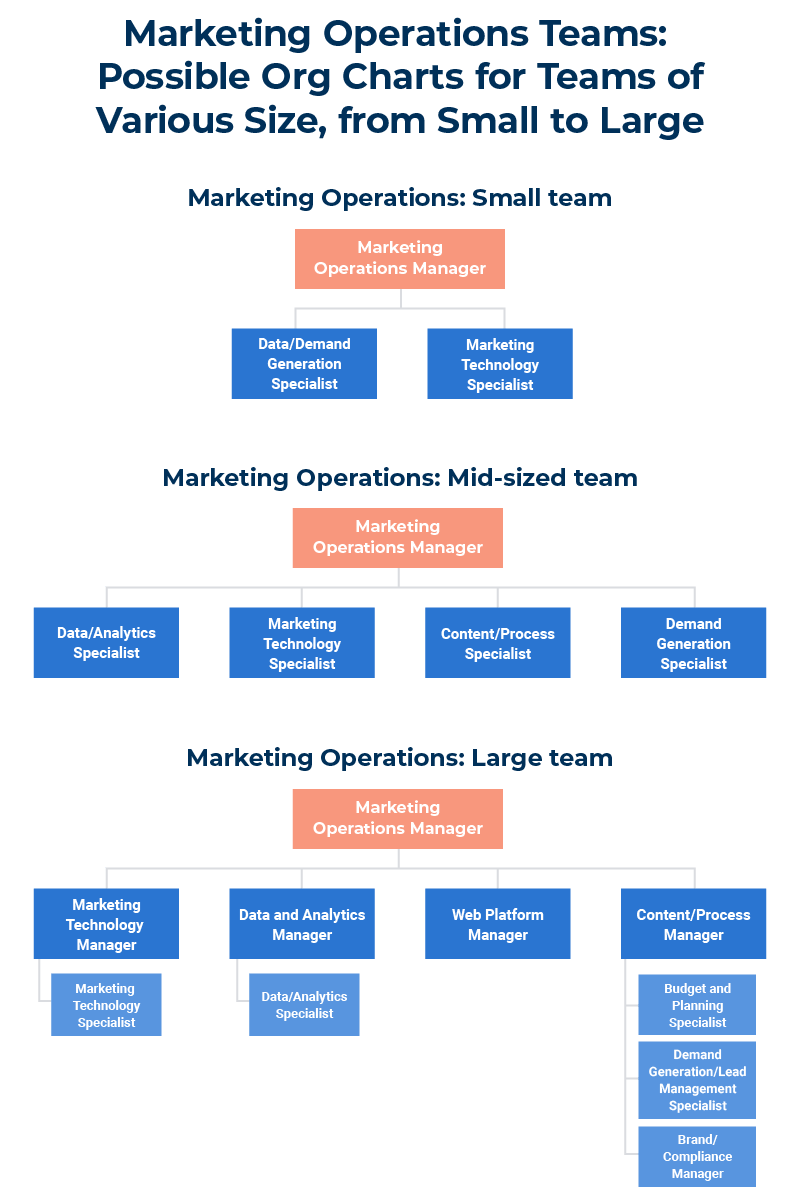What Is the Organizational Structure of a Marketing Operations Team?
A marketing operations manager usually heads the marketing operations team. That manager might report to a vice president of marketing. Below the manager are other team leads or specialists. Those staffers cover areas such as marketing processes, technology, and data analysis.
How to Build a Marketing Operations Team
You start building your marketing operations team by hiring an effective marketing operations manager. That manager then needs to follow certain guidelines when assembling a team. The manager establishes goals while considering best practices in the organization’s industry.
Here are some marketing operations best practices:
- Establish Goals and Objectives, Along with a Mission Statement: Writing down goals and objectives, along with a mission statement, helps clarify the ultimate purpose of your marketing operations team. It also helps team members better understand their responsibilities. Goals, objectives, and a mission statement can serve as the North Star for everything your marketing operations team does.
- Define Barriers and Change Strategies: There are always barriers to the smooth functioning of your marketing operations, especially at the beginning. Some barriers might involve technology. Some might involve organization employees who are resistant to change.
Your team needs to clearly articulate how well-functioning marketing operations make the organization’s overall marketing more effective and efficient. The team also needs to excel at managing change. - Build a Multi-Stage Plan: Building an effective marketing operations team doesn’t happen in one day or one week. You must determine what resources you require and what changes you need to make in stages. Those stages might include the following:
- Assessing the marketing technology you have and deciding what you need to add or change
- Determining the best organizational structure for your team
- Determining the skills your team needs and recognizing which of those skills you currently have and which you need to acquire
- Identify Roles and Responsibilities: Once you decide the best overall structure for your team, you want to identify specific roles and the current team members who can fill those roles.
Part of this assessment includes deciding who is responsible for your marketing technology and determining the specific components of your marketing technology. - If You Start Small, You Can Still Start Wisely: Some marketing operations teams might start with just one person: the marketing operations manager. Others might start with one or two more people. When a team is small, it’s important that members aren’t limited to expertise in only one area. Each member must have a broader field of expertise, says Jeff Pedowitz, President and CEO of the Pedowitz Group, a marketing consulting company based in Atlanta. “I would hire an expert in demand generation marketing who knows how to build from scratch,” he says. “This person has to be more of a generalist; then I would add more pieces as we grow. When you’re starting, the first couple of hires need to do anything and everything. They have to do whatever it takes to get in the door and drive revenue.”
- Consider Benchmarks for Overall Marketing Staffing: Create benchmarks for overall marketing staffing to help you determine the best size of your marketing operations team.
Frequently, you also need to convince your CEO and CFO of the value of proper marketing staffing to the organization as a whole. Sufficiently budgeting and staffing for your team is critical to marketing your products or services effectively, according to Jenn Morgan, Founder and CEO of Radically Distinct, a Seattle brand strategy and digital marketing agency. “Best practices in professional services recommend one marketing person per 14 people [in an organization],” says Morgan. “Most businesses are nowhere near that.” - Look at Case Studies on How Marketing Operations Teams Function: For organizations assembling a marketing operations team from scratch, it can be helpful to look over case studies of organizations that have built well-functioning marketing operations teams. These case studies provide details on a marketing operations team’s structure. They might also show how the team interacts with the overall marketing and sales teams, as well as with other departments.
- Consider Your Industry: The structure of your marketing operations team depends on the nature of your industry. An e-commerce company selling machine parts has different marketing operations roles than a strategic public relations agency does.
- Don’t Overlook the People in Your Company: As you identify roles that you need to build your team, don’t ignore people within your organization. They might be on your overall marketing team, in your information technology department, or other areas.
- Understand That Owners Can’t Do It All: In small businesses, owners or CEOs have a tendency to believe that they can perform certain work themselves. They might do this to avoid hiring or because they believe they can do the work best.
“What often happens is that business owners overutilize themselves and underutilize either outsourced support or their internal team,” says Morgan. - Identify Technical Challenges That Can Hamper Your Team: Marketing technology is important to any marketing operations team and overall marketing team. A marketing operations team must have staff members who can help the overall team understand and use marketing technology and deal with technical issues quickly.
- Pick the Best Tools for Your Team: The marketing technology experts on your team must also be able to assess your marketing technology needs. They must understand how different components of marketing technology can work together to make your team more effective. Your experts must also continually track changes and improvements in marketing technology on the market.
Teams Based on Marketing Operations Pillars
Companies often structure their marketing operations team in accordance with the primary pillars of marketing operations. To learn more about the primary pillars of marketing operations, visit the “Essential Guide to Marketing Operations.”
You might have a marketing operations staff that corresponds to the following pillars:
- Process Management:
- Budgeting and planning specialist
- Strategic planning specialist
- Demand generation/lead management specialist
- Brand and compliance manager
- Brand strategist: “Brand strategy is an essential skill that you need to have on your team,” says Morgan. “You might not need a full-time person. But if you're trying to reach niche audiences, and you're really trying to find new ways to reach new markets, a brand strategist is key. That person helps you identify your message and systematize that message. Brand strategy is crucial, especially if you're at the beginning of building up your operations.”
- Marketing Technology Management:
- Marketing technology manager
- Marketing technology specialist
- Data Analytics and Management:
- Data analyst
- Training:
- Training manager/specialist
Understand What You Can Outsource
As you build your team and, later, when you’re up and running, you might need specialized marketing operations skills. But you might not want to hire a full-time employee who possesses only those skills. Instead, hire specific contractors when needed.
“Outsourcing is a skill,” says Morgan. “If you’re trying to create a marketing operations team, make sure you’re not doing everything yourself. Treating outsourcing as a skill means having someone at the company whose specialty is recognizing what they don't know and, consequently, outsourcing a job as opposed to assigning it internally.”
“You have to decide which work you have the capability to fulfill internally and which work you need to outsource,” says Pedowitz. “But remember, the roles that you fill internally or outsource vary according to your industry and the nature of your organization. There really is no right or wrong answer.”
Download Questions to Ask When Hiring Marketing Operations – PDF
The Roles on a Marketing Operations Team
Depending on your industry and the size of your organization, your marketing operations team might have many roles or just a few. But almost all teams have at least a marketing operations manager.
Below are some of the most common roles on a marketing operations team.
Vice President of Marketing Operations
Job Description: In larger organizations with a large marketing operations team, this position oversees the entire team. This VP also leads the analysis of important organizational purchasing decisions for software and marketing technology.
Desired Candidate Traits: This role requires deep experience in marketing and a background in overseeing a marketing operations department. It also requires extensive project management and budgeting experience.
Marketing Operations Manager
Job Description: This person oversees all marketing operations. They also analyze marketing initiatives for effectiveness and efficiencies. In addition, this manager hires, oversees, trains, and develops an effective marketing operations staff.
Desired Candidate Traits: This manager is an organized, methodical team player with extraordinary interpersonal skills. They must be able to manage complex projects.
Marketing Technology Manager/Specialist
Job Description: This role oversees the use of all marketing technology, trains the team on the effective use of such technology, and continually assesses the organization’s technology for improvements. They also assess the marketplace for new technologies that the organization might adopt and integrate with existing technologies.
Desired Candidate Traits: This person has deep experience in using, assessing, and adapting marketing technology. They also have experience in training and working with the marketing team members to help them understand and use marketing technology.
Kelly Ann Collins, CEO of Vult Lab, a digital agency that helps brands, nonprofits, and nongovernmental organizations with integrated marketing communications, says a marketing technology specialist or manager is vital to a marketing operations team.
“Leaving [detailed technology support] up to the social media managers, graphic designers, copywriters, or bloggers is a mistake — because they get stressed out,” notes Collins. “It messes with their workflow. I think it can block some of their creative energy.”
Data and Analytics Manager/Specialist
Job Description: This manager/specialist analyzes and interprets marketing data to help marketing managers understand the effectiveness of the organization’s overall marketing and individual campaigns. This person uses predictive modeling and other methods of analysis to help the organization decide on future marketing investments and initiatives.
Desired Candidate Traits: This person has deep experience in data analysis in marketing, as well as strong mathematical and analytical problem-solving skills.
Digital/Web Platform and Strategy Specialist/Manager
Job Description: This person oversees all public-facing web platforms for the organization and ensures that those platforms are technically sound and continually adapted based on audience analytics. They also help strategize to increase overall traffic, to improve customer experience, and to convert more website viewers into customers.
Desired Candidate Traits: This specialist/manager has experience in developing and improving websites for sales-based organizations, as well as proven expertise in analyzing and increasing website traffic and conversions.
Marketing Operations Specialist
Job Description: This person helps keep all the day-to-day functions of marketing operations running smoothly. They also track marketing metrics and help analyze marketing campaigns. In addition, they manage projects, help teams meet deadlines, and support the marketing manager in other ways.
Desired Candidate Traits: They have experience in marketing and marketing operations. They are creative, detail-focused problem solvers.
Other possible positions on a marketing operations team include those below.
Inside Sales/Business Development Representative
Job Description: This person reaches out to potential customers through various marketing tools, including emails, website interaction, and social media. They help the team collect information on potential customers who express interest in the organization’s products and ensure that such info gets to the sales team.
Desire Candidate Traits: This rep has experience in sales and is detail oriented, persistent, and thorough.
Email Specialist
Job Description: This specialist creates marketing emails, sometimes from other materials. They help build and test email marketing campaigns, including running A/B tests on alternate versions of marketing emails. They also ensure appropriate delivery of such emails and monitor the results.
Desired Candidate Traits: This person is a strong, detail-oriented writer and editor. They have the ability to analyze, assess, and quantify the results of marketing emails.
Media Specialist
Job Description: This specialist purchases media (including broadcast, print, online, and other channels) for marketing messages. They also track budgets and monitor media spending.
Desired Candidate Traits: This person has experience in media purchasing and is a detail-oriented, thorough strategizer.
Content Editor
Job Description: The content editor creates content for all channels of an organization’s marketing. They track and organize all of the organization’s existing content and repurpose that content for various channels and marketing uses.
Organizations frequently position the content editor within the overall marketing team, rather than within marketing operations. You can also hire a contractor for this role.
Desired Candidate Traits: A strong writer and editor, this person is detail-oriented, fast, thorough, and accurate.
Graphic Designer
Job Description: The graphic designer works with the content editors to create compelling design and images that enhance and empower an organization’s important marketing messages.
Organizations frequently position the graphic designer within the overall marketing team, rather than within marketing operations. You can also hire a contractor for this role.
Desired Candidate Traits: This person has experience in graphic design and graphic design for sales. They are able to create compelling design and images that capture interest and enhance sales.
Download Common Marketing Operations Roles & Desired Traits - PDF
By-Products and Benefits of Successful Marketing Operations Teams
When your organization develops an effective marketing operations team, that team does more than improve your overall marketing. It can improve how your entire organization operates.
Here are some of the overall benefits of having an outstanding marketing operations team:
- Improves Team and Project Coordination: Marketing operations help marketing, sales, and other departments break out of their silos and work with other teams to improve sales.
- Increases Data Transparency: Marketing operations help build a structure that collects and tracks important data. Other departments can use that data to guide their decisions and contribute to an organization’s overall goals.
- Establishes and Improves Processes: Marketing operations improve marketing and sales by creating the structure that facilitates repetitive processes. And when processes are more efficient, so is the whole organization.
- Creates Structure to Accommodate Growth: As an organization gains customers and grows, this new structure enables the business to easily expand its programs and processes.
How to Ensure Your Marketing Operations Team Excels
You can hire the right people and put the right structure in place, but your marketing operations team will truly excel only when you follow certain guiding principles. Those principles focus particularly on how you leverage your team’s expertise.
Here are those guiding principles to help your team excel:
- Get Input from Technology Experts on Overall Marketing Strategies: Your technology experts have good ideas for overall marketing operations strategies, so make sure you get their input on a regular basis. They also know when a strategy simply isn’t technologically possible and can help with possible alternatives; their knowledge will save your organization time and money.
- Encourage Specialization: Your marketing operations team has experts. Make sure you capitalize on each team member’s expertise; don’t ask them to perform work that others on your team can do more effectively. When each of your staff members uses their full capabilities, your entire team performs better.
- Serve Your Key Stakeholders: Ultimately, marketing operations and marketing want to attract new customers and increase revenue. In order to achieve those goals, marketing operations must please some internal stakeholders. They include your organization’s chief executive officer, chief information officer, chief marketing officer, and director of marketing.
Each of those stakeholders expects marketing operations to show its value to the organization by meeting specific marketing, information technology, and overall business objectives.
Keeping Your Marketing Operations Team Engaged and Effective
In order for your marketing operations team to be effective, your organization must empower employees and make them feel valued. To achieve these goals, keep the following in mind:
- Keep salaries fair and consistent among comparable team members.
- Help team members grow and build expertise in specific areas of marketing operations.
- Provide incentives to encourage high-level collaboration.
- Provide overall leadership that team members can rely on and trust.
Important Tools in Marketing Operations
Approximately 8,000 pieces of marketing technology software now exist to aid marketing and marketing operations teams. Scott Brinker from the Chief Marketing Technologist blog compiles a comprehensive list of marketing technologies every year.
Brinker classifies marketing technology according to the following broad categories:
- Advertising and promotion
- Commerce and sales
- Content and experience
- Data
- Management
- Social and relationships
Other experts offer their own ways to categorize the technology. Some suggest dividing the technology into the basic topical areas of marketing operations:
- Collaboration: Helps your team work together and see the status of various projects
- Example Tool: Slack
- Budget: Helps your team with overall marketing budgets and budgets for specific initiatives
- Example Tool: Prophix
- Process: Helps your team with workflow processes
- Example Tool: Smartsheet
- Review and Compliance: Helps your team review and proofread content while also ensuring you meet industry regulations
- Example Tool: Ziflow
- Reporting: Helps your team report and access data, including data on marketing results
- Example Tool: Google Data Studio
Build and Maintain the Best Marketing Operations Team with Smartsheet
The best marketing teams know the importance of effective campaign management, consistent creative operations, and powerful event logistics -- and Smartsheet helps you deliver on all three so you can be more effective and achieve more.
The Smartsheet platform makes it easy to plan, capture, manage, and report on work from anywhere, helping your team be more effective and get more done. Report on key metrics and get real-time visibility into work as it happens with roll-up reports, dashboards, and automated workflows built to keep your team connected and informed.
When teams have clarity into the work getting done, there’s no telling how much more they can accomplish in the same amount of time. Try Smartsheet for free, today.




